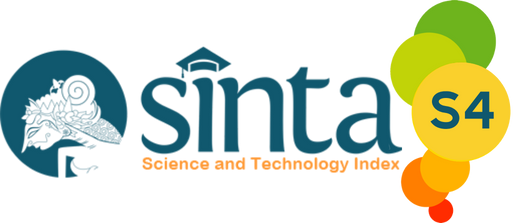Analysis of the Role of Teacher’s Parenting Styles on Student Learning Motivation at State Vocational Schools in Surakarta
Abstract
The motivation of students to learn is greatly influenced by their teachers. Teachers are significant figures in the classroom who can uplift and mentor students. The parenting and teaching styles of educators can foster an atmosphere that encourages students to become motivated learners. A spirit of learning can be fostered by teachers who can offer constructive criticism, offer challenges that are appropriate for their student's abilities, and pay attention to each student's personal growth. The purpose of this research is to ascertain how teacher parenting influences students' motivation to learn. Teachers and students are the study's subjects, and a qualitative descriptive method is being used. Three methods were employed to acquire the data: observation, interviews, and documentation. Data analysis used descriptive qualitative data analysis. The results of the study show that the dominant teacher parenting in motivating student learning is democratic parenting. This parenting style emphasizes open communication, giving freedom of expression, and instilling positive values in students. Democratic parenting can increase student learning motivation because it can make students feel valued, recognized, and in control of themselves. In addition, democratic parenting can also shape students' positive characteristics, such as discipline, independence, and communication. These positive characteristics can support students in learning and achieving maximum achievement.
Keywords
Full Text:
PDFReferences
Abdussamad, H. Z., & Sik, M. S. (2021). Metode penelitian kualitatif. CV. Syakir Media Press.
Adawiah, R. (2017). Pola Asuh Orang Tua dan Implikasinya terhadap Pendidikan Anak: Studi pada Masyarakat Dayak di Kecamatan Halong Kabupaten Balangan. Jurnal pendidikan Kewarganegaraan, 7(1), 33-48. http://dx.doi.org/10.20527/kewarganegaraan.v7i1.3534
Arianti, A. (2019). Peranan Guru dalam Meningkatkan Motivasi Belajar Siswa. Didaktika: Jurnal Kependidikan, 12(2), 117-134.doi:https://10.30863/didaktika.v12i2.181.
Arikunto, S. (2010). Prosedur penelitian suatu pendekatan praktis. Jakarta: Rineka Cipta.
Dhanurendri, C. S., & Kuspriyanto, M. K. (2018). Keberadaan Pola Asuh Guru dalam Meningkatan Hasil Pembelajaran Mata Pelajaran Geografi Siswa Kelas X di SMA Negeri 1 Waru Sidoarjo.
Fadhilah, T. N., Handayani, D. E., & Rofian, R. (2019). Analisis Pola Asuh Orang Tua terhadap Motivasi Belajar Siswa. Jurnal Pedagogi Dan Pembelajaran, 2(2),249-255.https://doi.org/10.23887/jp2.v2i2.17916.
Fauzi, A., Widiastuti, I., & Suharno, S. (2022) Analysis of Enterpreneurial Intent in Vocational High School Students Based on a Review on Contextual, Background, and Personal Characteristics. Jurnal Ilmiah Pendidikan Teknik dan Kejuruan, 15(1),28-36. https://doi.org/10.20961/jiptek.v15i1.64951.
Masni, H. (2017). Peran pola asuh demokratis orangtua terhadap pengembangan potensi diri dan kreativitas siswa. Jurnal Ilmiah Dikdaya, 6(1), 58-74. http://dx.doi.org/10.33087/dikdaya.v6i1.41.
Mukhtar, M. (2020). Urgensi Pola Asuh Guru dalam Membentuk Akhlak Anak Usia Dini. Jurnal Elkatarie: Jurnal Ilmu Pendidikan dan Sosial, 3(2), 502-518. https://doi.org/10.1234/elkatarie.v3i2.4080.
Muliawan. (2014). Metodologi penelitian pendidikan. Yogyakarta: Gava Media.
Mustaghfirin, M. (2022) Pengaruh Penerapan Problem Base Learning Terhadap Motivasi Peserta Didik Di SMP Negeri 1 Wonotunggal. Journal of Informatics and Vocational Education, 5(3). https://doi.org/10.20961/joive.v5i3.70708.
Nadhifah, I., Kanzunnudin, M., & Khamdun, K. (2021). Analisis Peran Pola Asuh Orangtua Terhadap Motivasi Belajar Anak. Jurnal Educatio FKIP UNMA, 7(1),91-96. https://doi.org/10.31949/educatio.v7i1.852.
Permatasari, L., Yuana, R., & Maryono, D. (2018). Implementation of Scratch application to improve learning outcomes and student motivation on basic programming subjects. Indonesian Journal of Informatics Education, 2(2), 97-104. https://doi.org/10.20961/ijie.v2i2.15206
Putro, K. Z., Amri, M. A., Wulandari, N., & Kurniawan, D. (2020). Pola interaksi anak dan orangtua selama kebijakan pembelajaran di rumah. Fitrah: Journal of Islamic Education, 1(1), 124-140. https://doi.org/10.53802/fitrah.v1i1.12.
Sardiman. (2011). Interaksi dan motivasi belajar mengajar. Jakarta: Rajawali Pers.
Setyowati, A., Efendi, A., & Basori, B. (2018). The Analysis of Reward Systems Implementation in Basic Network Course: Case Study of a Vocational School in Solo, Central Java. Indonesian Journal of Informatics Education, 2(1), 57-64. https://doi.org/10.20961/ijie.v2i1.13198
Slameto. 2010. Belajar dan faktor-faktor yang mempengaruhinya. Jakarta: Rineka Cipta.
Sugiyono, M. (2015). Penelitian kombinasi (mixed methods). Bandung: Alfabeta.
Syah, A., Mattalatta, M., & Ilyas, G. B. (2017). Pengaruh Budaya Organisasi, Mutasi, Motivasi Terhadap Kinerja Pegawai Negeri Sipil pada Kantor Distrik Navigasi Kelas I Makassar. Jurnal Mirai Management, 2(2), 215-230. https://doi.org/10.37531/mirai.v2i2.52.
Taib, B., Ummah, D. M., & Bun, Y. (2020). Analisis Pola Asuh Otoriter Orang Tua Terhadap Perkembangan Moral Anak. Jurnal Ilmiah Cahaya Paud, 2(2), 128-137.https://doi.org/10.33387/cahayapd.v2i2.2090.
Tambalo, D., Imran, I., & Septiwiharti, D. (2014). Meningkatkan Motivasi Belajar Siswa Kelas IV SD Inpres 2 Kasimbar Melalui Metode Tanya Jawab pada Mata Pelajaran PKn. Jurnal Kreatif Online, 2(4).
Wibowo, A., & Gunawan. (2015). Pendidikan karakter berbasis kearifan lokal di sekolah: konsep, strategi, dan implementasi. Yogyakarta: Pustaka Pelajar.Refbacks
- There are currently no refbacks.








